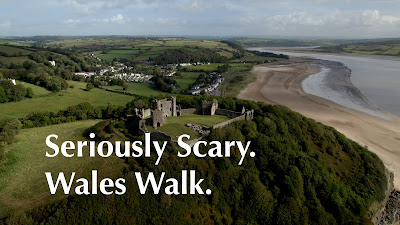Volunteers Week - Lifesaving Lookback
Did you know that in addition to our year-round work to keep people safe around the UK’s coasts, our teams of dedicated volunteers and staff are always on call to lend a hand to other emergency services and partners?
Over
the last year, our teams, our vehicles and search and rescue helicopters have
been involved across the country providing support where it’s needed most. This
Volunteers Week, we’re taking a look back on just a few of the ways in which we’ve
come to the rescue in what’s been an extraordinary year.
 |
| Credit: Stornoway Coastguard Rescue Team |
COVID-19
response
In Scotland’s Western Isles, our volunteers and staff stepped in to help with carrying essential tests in complex and crucial transportation that involved two ferry crossings and road trips in a 140-mile trip. The search and rescue helicopter from Stornoway also supported NHS Western Isles by moving vulnerable patients from Barra to hospital in Stornoway. And the work has continued with the provision of transport for people needing to attend the vaccination clinics and assisting at the clinics.
In
Suffolk and North East Essex, our coastguard rescue teams worked closely with
East of England Ambulance Service NHS Trust. By enrolling as first responders,
they were able to help to free up the ambulance service by responding to and
travelling to non COVID-19-related patients in need of immediate medical assistance
before the ambulance service arrived.
Flooding
In
June last year, people from 300 properties needed to be evacuated as a result
of flooding in the Lincolnshire area. Our HM Coastguard teams stepped in to
help with the operation, working closely with other emergency services and local
authorities.
And
in Wales, this was the moment when HM Coastguard’s helicopter battled against
the elements to rescue three people including a child, caught up in the floods
in North Wales.
The HM Coastguard search and rescue helicopter from Caernarfon was called as part of the wider emergency response to floods across the area alongside North Wales Police, the Welsh Ambulance Service and the Welsh Fire and Rescue Service.
High
water had forced the three out of their homes after the banks of the River Dee
burst following heavy rainfall. The Aeronautical Rescue Coordination Centre,
part of HM Coastguard, took the request from other emergency services after it
became clear the people could not be reached by land.
Chief
Pilot Dave Kenyon said: “This was a challenging winching scenario in terms of
where the people were. They were on a ledge by the roof, with debris falling
and being washed away all around them. We’re delighted that all three were got
out safe and well, and handed into the care of the other emergency services.”
WW2
Ordnance in Exeter
At
the end of February this year, Exeter made the international news headlines when
a large, 1,000lb live WWII Hermann bomb was found. Our volunteers and 11 teams
from around the region spent over 45 hours at the scene, helping to evacuate
people from 2,600 nearby properties including 1,400 university students before
the bomb could be safely detonated by Royal Navy experts.
 |
| Screen grab from Exeter City Council's video |
Commenting just after the event, Drew
Parkinson, Coastal Operations Area Commander for HM Coastguard said; ‘We are
fortunate to have so many dedicated volunteers and staff within HM Coastguard
who are willing to drop whatever they are doing at a moment’s notice to use
their training and expertise to help those in need, be that at incidents around
the coast or when our partner emergency services require assistance.
‘To
all the officers who worked phenomenally hard this weekend, with over 1000
individual hours worked in Exeter alone – thank you.’
 |
| Credit: Drew Parkinson |
Mutual
aid in Dover
Just
before Christmas last year, many hundreds of people faced days of misery stuck
in queues at Dover. We worked closely with other agencies and partners as part
of the Kent Resilience Forum (KRF), with a shared priority of keeping people safe,
HM Coastguard was on the front line distributing the KRF’s welfare supplies.
Our volunteers
and staff worked around the clock, delivering water, food and immediate first
aid to the people affected.
More
than 60 HM Coastguard volunteers and HM Coastguard staff delivered essential
supplies directly to the waiting lorry drivers.
Commenting
on the incident at the time, Matt Pavitt, Coastal Operations Area Commander
based at the HM Coastguard’s Dover operations centre, said:
“We
first became involved on Sunday evening and since then, we haven’t stopped and
we won’t stop until we are no longer needed. We’re working closely with our
partner agencies and all emergency services in the area to ensure people are
kept as comfortable and safe as possible at this difficult time.
“The
whole community worked as one team with a common goal and we’re immensely
grateful for everyone’s support. And I’d like to say a special thanks to our
teams who always go above and beyond the call, we are very proud of their
dedication and the work they are doing now and all year round.”
Alun
Newsome, Divisional Commander, HM Coastguard added: “Keeping people safe around our coasts is
what we do. Less well known is that we also work closely with emergency
services partners to deliver mutual aid in the event of emergencies when the
health and well-being of people is at risk. I’d like to add my thanks to all
our teams and our partner agencies for the impressive efforts that are going on
right now in the Dover area.”
Our
volunteers and HM Coastguard staff around the UK are on call 24/7, 365 days a
year. One hand to help our emergency services partners and other authorities at
any time when people are in need.
To our volunteers: We salute you!




